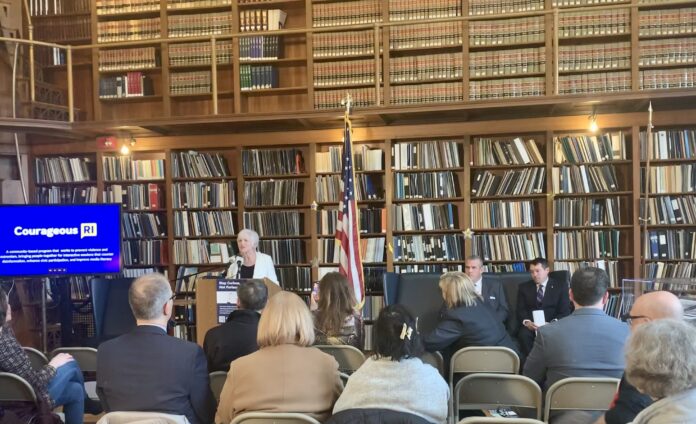
SOUTH KINGSTOWN – A new media literacy initiative that plans to help empower the community at large to build media literacy skills and be more resilient against disinformation and propaganda will be launched Tuesday by the Media Education Lab at the University of Rhode Island’s Harrington School of Communication and Media.
The initiative, called “Courageous RI,” is being funded by a two-year, $700,000 U.S. Department of Homeland Security grant and will foster community conversations, training and education and engaging local youths about the harms of false beliefs portrayed in various media forms. Pam Steager, the Media Education Lab’s director of public engagement, said curiosity is a skill that has been harmed by the current political polarization in society. Courageous RI hopes to “bring curiosity back.”
“Media literacy is so much about asking questions,” Steager said. “It’s about asking questions about everything, especially media messages.”
Courageous RI officials and state leaders formally launched the initiative Tuesday in Providence at the Statehouse. R.I. Secretary of State Gregg Amore; Rep. Brian Newberry, R-North Smithfield; Sen. Hanna Gallo, D-Cranston, and Cranston Public Library Director Ed Garcia attended the launch event.
Amore, a former high school civics and history teacher, said in a statement he has seen firsthand the value civics education carries not only for students but for democracy.
“By providing a space where educators, students and others can go for tools and support, Courageous RI is connecting Rhode Islanders to their communities, especially young people who are at particular risk of being exposed to dangerous disinformation and violence online,” Amore said.
Media Education Lab founder and Co-Director Renee Hobbs on Tuesday recalled when the U.S. Holocaust Memorial Museum in Washington asked her when she was a museum consultant to create learning materials that connect the historic concept of propaganda and the 21st century. With the rise of the “fake news” movement from conservative circles, the museum and Hobbs, she said, created educational materials to teach about propaganda, culminating in a book she wrote called “Mind over Media: Propaganda Education for a Digital Age.”
Hobbs said when Homeland Security identified media literacy as a “promising practice” for addressing the need for society to be resilient against propaganda, she noticed that government officials had read her book. From there, that push to teach about propaganda and its harms led to Courageous RI’s creation.
Steager said the lab expanded beyond what the funding was originally earmarked for media literacy into more programmatic areas. The reason, she said, is that the lab wanted to create a “model media literacy program” that other states could potentially replicate. Rhode Island is the only New England state that received Homeland Security funding for such an initiative this year, Steager said.
Courageous RI will have three educational phases. The first, called “Courageous Conversation,” which begins March 7, will invite Rhode Islanders to join in one-hour online sessions that Steager says will be part skill-building and part conversation. Hobbs said one or two media artifacts will be discussed and interpretations about the artifacts will be shared with the group, and how to learn people’s viewpoints without having “to fight about it.”
“We discover that what may seemed at first to be silly and superficial can actually be more complicated,” Hobbs said, “and people’s interpretations of it are situated in what their existing beliefs are. One may say ‘oh that’s harmful,’ while I may say ‘I actually kind of agree with it.’”
The second program, called “Courageous Questions” and will be held in the summer, will bring together high school teachers and college professors to share teaching strategies and resources on how to combat propaganda and disinformation. Hobbs says educators are affected negatively by the rise of disinformation in society. Librarians and law enforcement officials will also be part of the conversations, Hobbs said.
The “Courageous Creativity” program, will be a contest inviting youths and young adults across the state to create positive messages about wanting a world that is “less intense and less hateful,” Steager said. Winning message entries will receive monetary prizes.
“We think [the young people] are going to inspire us to make some changes that we need to make in our own communication behavior if we’re ever going to move forward in our state,” Seager said.
Both Seager and Hobbs said those participating in community conversations during Courageous RI’s first two phases will also receive monetary stipends to help expand the program’s reach, although it is unclear how much each participant will get. The program is also inviting state elected officials to be part of the conversations as well, they said.
Moving forward, Courageous RI, if successful, will become a permanent program after two years. Hobbs said media “keeps changing” and what the program will offer will not make disinformation go away. However, bringing people together will he the best way to address propaganda and bad information, Hobbs said.
“People don’t feel so hopeless. They don’t feel so angry,” she said. “By talking about it, it gives them strategies that deals with this kind of complicated media that might not tell the truth.”
Additional information on the initiative can be found on Courageous RI’s website.
(Update: Details from event at Statehouse added in 4th, 5th and 6th paragraphs)
James Bessette is the PBN special projects editor, and also covers the nonprofit and education sectors. You may reach him at Bessette@PBN.com. You may also follow him on Twitter at @James_Bessette.












Apparently, URI does not appreciate the irony of accepting and facilitating a $700k grant from the ‘Department of Homeland Security’ to address ‘propaganda’ and ‘misinformation’